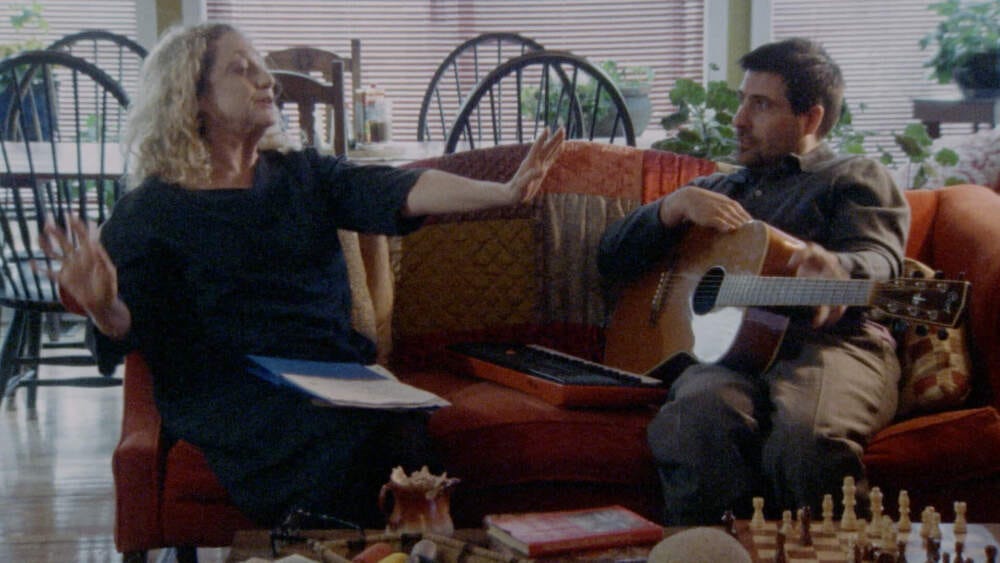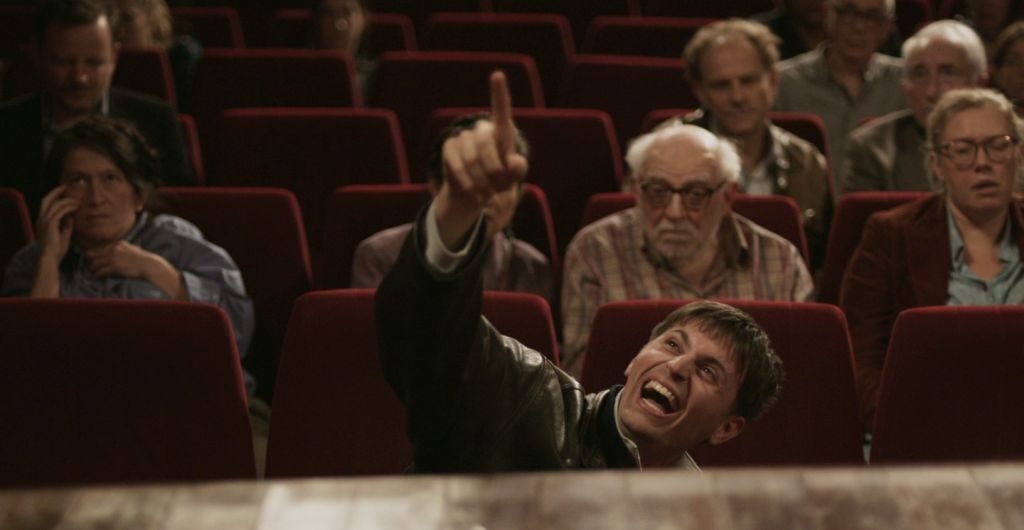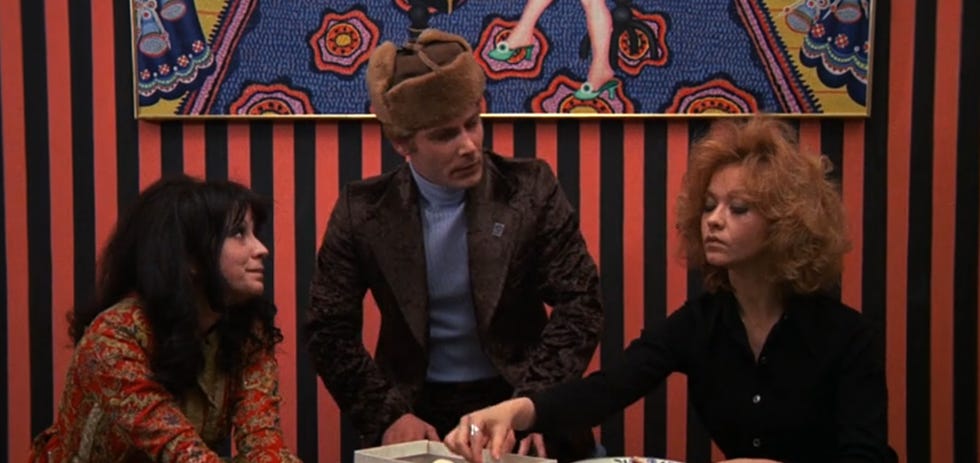Films of Critique, Films of the Ineffable, Films of Serious Play
Some of my favorite new-to-me views of the past few months
In the flurry of end-of-year listicles and the sorry state of the world, I missed my usual top views from the last (two) months. I’d recommend all of these with no reservations, but as you’ll see, they’re also… well, unique. I also realized they fit into one of at least three categories, so I’ve separated them out here to give a sense of comprehensibility/vibe.
Films of Critique
Soundtrack to a Coup d'Etat by Johan Grimonprez, 2024
There was a lot of buzz surrounding this film, and I was glad I dragged my sorry, exhausted post-8-hour-play (Gatz) butt over to Nighthawk to see a Sunday matinee of this documentary. What I greatly appreciated about this film is its ability to weave a complex story of music and politics, demonstrating how some artists take on a truly activist and revolutionary role (like Max Roach and Ornette Coleman, speaking against apartheid and genocide explicitly, and protesting the assassination of Patrice Lumumba) and some end up unknowingly serving as pawns in the game of American imperialism (Nina Simone, Louis Armstrong). It’s painful viewing for those who like their work, but it also does not lay blame on individual artists, but the way the liberatory potential in music cannot really stand on its own, and can be easily inscribed in existing nefarious power structures. Although I have to admit that my favorite part of the film was the archival footage and description of African communists, especially Patrice Lumumba. I also loved all the pro-Khrushchev sentiment, although I know this part rubbed some Americans the wrong way!
The Archive Project by John Hughes, 2006
Cartoonist Sam Wallman recommended this film during my Australia visit as a way of learning about radical leftist Australian film history, and I was really quite astonished by John Hughes— who I ended up meeting in person a few days later at Visible Evidence! (no relation to the Brat Pack film director). John Hughes is in the tradition of Eisenstein and Vertov-inspired filmmakers of the archive, who transforms a medium into something dis-orienting and exciting rather than re-orienting and pedagogical. Which doesn’t mean there isn’t a lot to learn here! The Archive Project is about Melbourne’s Realist Film Movement (1945-1959), an explicitly communist group of filmmakers inspired by the Soviet Union and, later, neo-realism who aimed to make films about and for workers. The context here is the Cold War, and the Realist Film Movement’s increasing tensions with the communist party. These were, of course, communists, but became increasingly unorthodox. A really wonderful overview of a movement I knew nothing about, but edited in an exciting and idiosyncratic way!
Swallow by Carlo Mirabella-Davis, 2019
When my ex-husband was in medical school, I think we both developed a morbid fascination with pica, a disease in which a person develops a craving for the consumption of inedible objects. The way he described it made it seem like a nutritional imbalance, but after watching the film and doing more research it does appear to be a mental health condition, something akin to an eating disorder, largely affecting children and pregnant women. Unsurprising! when you feel not in control, you will try to exert control over something… anything… and sometimes, that control will manifest as the desire to eat nails. Which this protagonist does. It’s a fable-like story, overly simplistic, perhaps, but I think there’s a beauty to the simplicity of the narrative: the overly manicured mise-en-scene, the symmetric framing, the grotesque and horrible wealth of the family. I think there’s a deep undercurrent of anticapitalism, too, something I also see in shows like Severance: the over-controlled mise-en-scene literalizing the control enacted by larger systems over our everyday lives.
Films of the Ineffable
Between the Temples by Nathan Silver, 2024
I resisted watching this film because the trailer made it seem unexceptional. I generally think studios do their films a disservice if they highlight the more conventional parts of the narrative rather than the unconventional— especially a film like this one, which is deeply, profoundly weird. The entire film feels like it’s shot from the perspective of someone for whom the edible is just about to hit. The editing and cinematography is erratic and fascinating, and the drug metaphor is extremely apt because the film also has my favorite psychedelic sequence in recent memory. The plot? It’s not as important as the vibe, but: a cantor grieving his dead wife and losing the ability to sing reconnects with his old music teacher from school, and proceeds to guide her through the bat mitzvah process even in her old age. It’s somewhat disturbing and the opposite of saccharine, and I adored every moment— so much so I was tempted to watch it again straight from the beginning.
Janet Planet by Annie Baker, 2024
In another decade, this would be classified as a mumblecore film. In this era, it is A24 in its more gentle, abstract, and experimental mode. Annie Baker is best known as a playwright but here the atmosphere is as important as the characters and the plot: the dense forests of rural Western Massachusetts, the late summer mosquitos, the wood cabins, the quiet. Many descriptions of the film describe it as a child (Lacy) falling out of love with her mother Janet, but I found myself increasingly captivated by Janet, who reminded me of so many of my friends: gentle, capable, artistic, looking for love in all the wrong places. I wanted to live in this film. If I could videodrome myself into that gentler 1991 world, I would.
Short films by Masha Vlasova: it razes that visual itch like; flare; Solar Storm; Midsummer
I sat in front of Masha at a Visible Evidence screening, and we had that moment of mutual recognition where we realized that we had actually corresponded for years! We had been introduced by a mutual friend a few years back when I was guest-editing the Soviet Issue of Jewish Currents. We had that instant friend chemistry when you know you are immediately on the same wavelength. Never gets old! Anyway, I truly loved Masha’s experimental films. My favorite documentary films fall right on the line between documentation and experimentation, and here the concept of visible evidence becomes more the evidence of light and acid as tracing on film stock (usually but not always 16mm, I believe). Chemistry and physics are not my strong suit so I am especially impressed when such labor-intensive analog techniques are used to create something beautiful and affective, both granular and planetary.
Snow Canon by Mati Diop, 2011
I didn’t expect a lot when I put on this short by Mati Diop set in the French alps, but the film certainly delivered a lot more than it promised. On surface, the narrative does not sound especially experimental: a bored young teen is stuck in her parents’ cabin in the alps (poor baby *insert eyeroll*) while on break from school, and she is watched over by an American 20-something hired by her parents. They become closer, and things, as often in Diop films, merge into the surreal and fantastical. The babysitter is played by internationally recognized Lebanese-American artist (and extremely hot person) Nour Moubarak. The whole thing is chocolate-covered strawberries for the eyes. I also quite loved a little glimpse into how French kids used to text with leetspeak, in the pre-smartphone days, displayed on screen: “tfq” (tu fais quoi) “ptn” (putain) “bcp” (beaucoup) “2m1” (demain) etc.
Films of Serious Play
Family and the Zombie by Karrabing Film Collective, 2024
The Karrabing Film Collective is comprised of about 50 Indigenous aboriginal people in Australia who are all part of the same family, and one non-indigenous person, the Columbia University anthropology professor Elizabeth Povinelli. This caused some controversy at the Visible Evidence conference where I saw these films. Povinelli was one of the founding members of the collective, but wasn’t at all discussed in the Q&A with the collective itself, as a kind of absent voice or ghost member. In a way, their film Family and the Zombie literalized this experience: Povinelli played a literal zombie, creepy and covered in white paint, spewing goo while children and other collective members ran away. All Karrabing films which we saw at the conference had a general atmosphere of serious play, and this was especially true in this quasi-documentary/improvisational quasi-fantastical film. However one thinks of the ethics of ignoring Povinelli’s contribution to the genuinely amazing work of the collective (and I’m personally agnostic on the subject), without a doubt, Povinelli is a captivating and charismatically creepy goo-covered zombie.
Yannick by Quentin Dupieux, 2023
What if the proletariat— the real proletariat, not downwardly-mobile intellectuals—went to a bad, pretentious play? And what if this member of the proletariat were carrying a gun? And what if this member of the proletariat decided to rewrite the entire play and hold all the audience members hostage while he does so? What if his rewriting is actually good? What if the actors try to escape? What if the hostages try? In an era of school shootings it might sound strange to support a film in which a white man with a gun wreaks havoc on cultural forms, but here the weapon’s presence unveils the unwritten, class-based laws structuring all of society. Yannick, the gun-toting enfant terrible, becomes a foil to the absurdity of bourgeois culture at large. There is something surrealist about the film, something both 1920s and 1960s, something terrifying and funny and strange. I couldn’t stop thinking about it for weeks.
WR: Mysteries of the Organism by Dušan Mukavejev, 1971
I don’t know why I had the misconstrued idea that Dušan Mukavejev’s films were pretentious; possibly because they are frequently mentioned within the same breath as Jean-Luc Godard’s films, which are pretentious (which hasn’t stopped me watching every single film he made from 1960 to 1975…) WR: Mysteries of the Organism is part psychedelically-edited documentary interviews and homage to Wilhelm Reich, a Marxist and antifascist psychoanalyst who, like Herbert Marcuse, investigated the relationship between sexual repression and fascist behavior. Reich and Marcuse were both figureheads of a sexual politic of the late 1960s that merged sexual and political liberation, and while the film doesn’t necessarily critique this, it plunges it into fictionalized goofy absurdity. The documentary part of the film is soon overtaken by the fictional: a sexually-liberated communist Yugoslav woman, Milena (played by Yugoslav megastar Milena Dravić), tries to seduce a Soviet figure-skater named Vladimir Ilych (har har). The narrative is interrupted by hilarious speeches about sex and liberation that toe the line between ironic and sincere. It is possibly the smartest, cheekiest, and certainly most fun film about sex that I’ve ever seen.














